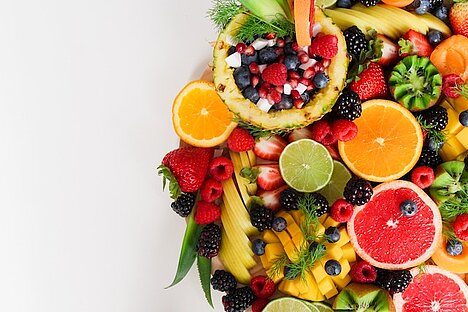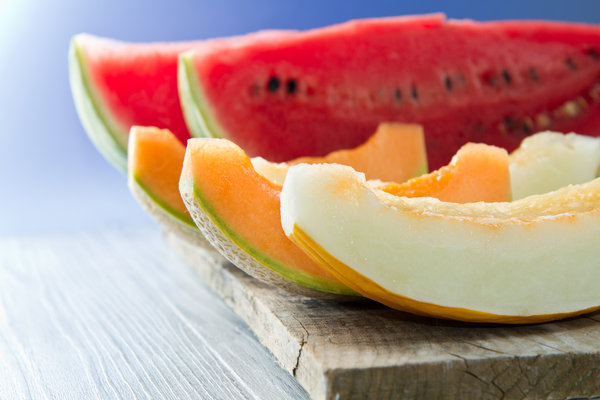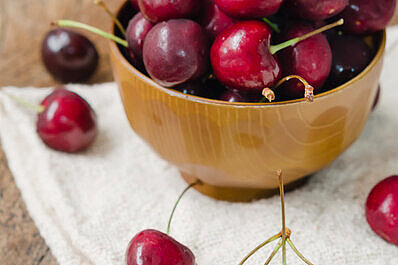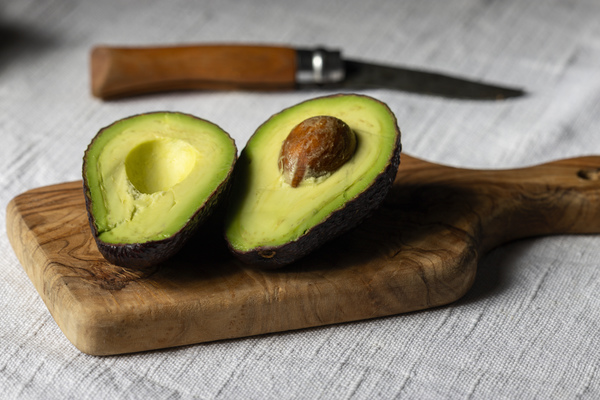Fruits

Which fruits can dogs eat?
Most fruits are safe for dogs as long as you give them in moderation and without seeds or peel. The most popular and healthiest fruits for dogs include
- Apple: It is rich in vitamin C, potassium, calcium and pectin, a soluble fiber that supports the intestinal flora. It is also good for the teeth as it removes plaque when chewed. However, make sure you remove the core as it contains hydrocyanic acid, which can be toxic in large quantities.
- Banana: It is a good source of potassium, magnesium, vitamins B6 and C, as well as carbohydrates that provide energy. It is also easily digestible and can help with diarrhea. However, only give your dog small pieces, as bananas contain a lot of sugar and can lead to obesity.
- Pear: It is similar to apple, but even juicier and sweeter. It contains lots of vitamin C, K, potassium, copper and fiber. It can also help with constipation. Again, you should remove the seeds as they contain hydrocyanic acid.
- Melon: It is refreshing and hydrating as it contains a lot of water. It is also rich in vitamins A, C, B6, potassium and folic acid. It can improve eyesight and the immune system. However, you should only give them the flesh and leave out the skin and seeds as they are difficult to digest and can cause intestinal blockages.
- Berries: They are true superfoods for dogs as they contain lots of antioxidants that can protect against free radicals and reduce inflammation. These include strawberries, raspberries, blackberries, blueberries and currants. They are also rich in vitamin C, K, manganese and fiber. They can be given raw or frozen, but only in small quantities as they contain a lot of fructose.
Which fruits should you avoid?
Not all fruits are suitable for dogs. Some can cause stomach problems, diarrhea, vomiting or even poisoning. Fruits that you should never give your dog include
- Grapes: theyare highly toxic to dogs and can lead to acute kidney failure. The exact cause is not yet known, but just a few grapes are enough to trigger severe symptoms. These include loss of appetite, lethargy, abdominal pain, vomiting, diarrhea, dehydration and increased thirst and urination.
If you suspect that your dog has eaten grapes, you should consult a vet immediately. - Citrus fruits: Although they are not poisonous, they are very acidic and can irritate your dog's stomach. Citrus fruits include oranges, mandarins, lemons, limes and grapefruits. They also contain psoralen, a substance that can cause photosensitivity and skin irritation. Most dogs don't like the taste of citrus fruits anyway, but if you want to give them some, you should only give small amounts and only the flesh without peel or seeds.
- Stone fruit: This includes cherries, plums, peaches, apricots and nectarines. Although they are rich in vitamins and fiber, the pits contain hydrocyanic acid, which can be toxic in large quantities. In addition, the seeds can lead to intestinal obstruction if they are swallowed. You should therefore only give your dog the flesh and remove the seeds.
- Avocado: It is very healthy for humans, but not for dogs. It contains persin, a substance that can cause vomiting, diarrhea, respiratory distress and heart problems. In addition, the pit is very large and can cause choking or intestinal obstruction if swallowed. You should therefore not give your dog avocado.
What is the best way to feed fruit?
Fruit is a tasty and healthy supplement for dogs, but not a substitute for a balanced diet. You should therefore only give them as a snack or reward and they should not make up more than 10% of the daily calorie intake. You should also keep the following tips in mind:
- Wash the fruit thoroughly to remove any dirt, pesticides or bacteria.
- Cut the fruit into small pieces that your dog can easily chew and swallow.
- Remove any seeds, peels, stems or leaves that may be toxic or difficult to digest.
- Introduce new fruits slowly and observe how your dog reacts to them. Some dogs may be allergic or sensitive to certain fruits.
- Avoid candied, dried or canned fruits as they contain a lot of sugar, salt or preservatives that can be harmful to dogs.
Fruit is a great way for dogs to get some variety and additional nutrients. But not all fruits are suitable for dogs. You should always find out which fruits you can give your dog, which you should avoid and how best to feed them.
Properties 6
Are you looking for other ingredients with a specific property?
Just click on them to find more.
If you notice any signs of hypersensitivity or poisoning in your dog, you should see your vet immediately. We are not a substitute for a vet, but we try to be as accurate as possible. Every dog reacts differently and we recommend you get a second opinion or consult your vet if in doubt.
Stay healthy and take good care of your four-legged friend!😊
Similar to Fruits
Bananas are the fruit of the banana tree, which grows in tropical and subtropical regions. They have a yellow peel that can be peeled off and a soft, sweet flesh. Bananas are rich in carbohydrates,...
Melon is a collective name for various types of cucurbits that produce large, round fruits with soft flesh and many seeds. There are many varieties of melon, such as watermelon, honeydew melon,...
A cherry is a stone fruit that belongs to the rose family. There are many different varieties of cherries, which differ in color, size, taste and sweetness. The best known are sweet cherries and...
An avocado is a pear-shaped fruit with a green or black skin and a large stone in the middle. It originally comes from Central America and is now grown all over the world. Avocados have a high fat...



